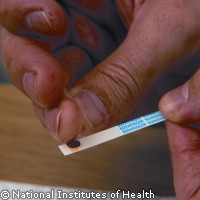'Fat-burning' gene key for controlling blood sugar levels
An international team of researchers has identified a 'fat-burning' gene which plays a key role in maintaining our cells' sensitivity to insulin. The gene is reduced in people with high blood sugar levels and type 2 diabetes. The work, which was partly funded by the EU, is published in the latest edition of the journal Cell. Type 2 diabetes is caused by a reduction in insulin production by the pancreas or the inability of other tissues to respond adequately to insulin, a situation known as insulin resistance. When the cells fail to respond to insulin, blood sugar levels rise, which in turn causes a worsening of the insulin resistance. This increases the risk of developing serious diabetes-associated complications such as blindness and kidney failure. Controlling blood sugar levels helps to improve the insulin sensitivity of tissues and reduces the likelihood of developing these complications. In this latest piece of research, the scientists studied an enzyme called diacylglycerol kinase (DGK) delta, which is vital for maintaining the insulin sensitivity of cells. DGK delta plays a role in breaking down lipids. The researchers found that the gene which produces DGK delta is less active in the muscle tissue of people with high blood sugar and type 2 diabetes. In the absence of this gene, the muscle cells were less sensitive to insulin and had impaired fat burning ability, increasing the person's risk of developing obesity. The good news is that correcting blood sugar levels through exercise or drugs boosts the activity of the gene which produces DGK delta and restores the insulin sensitivity of the cells. 'The expression of this gene is reduced when blood sugar rises, but activity can be restored if blood sugar is controlled by pharmacological treatment or exercise,' explains Professor Juleen Zierath of the Karolinska Institute in Sweden, who led the research. 'Our results underscore the importance of tight regulation of blood sugar for people with diabetes.' Support for the research came from the EU-funded projects EXGENESIS ('Health benefits of exercise: identification of genes and signalling pathways involved in effects of exercise on insulin resistance, obesity and the metabolic syndrome') and EUGENE2 ('European network on functional genomics of type 2 diabetes'), both of which are financed through the 'Life sciences, genomics and biotechnology for health' activity area of the Sixth Framework Programme (FP6).



